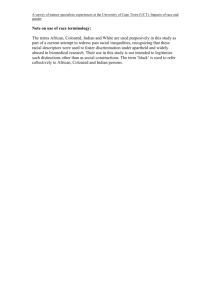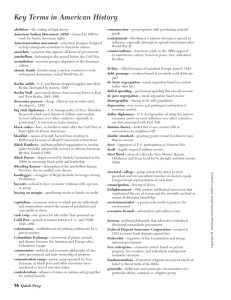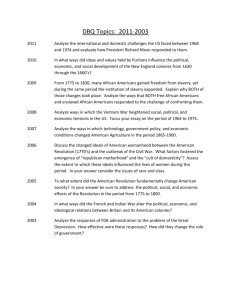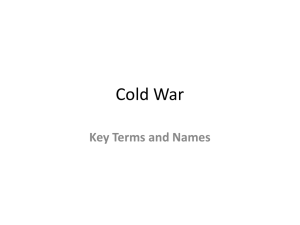Goal 11 - TeacherWeb
advertisement
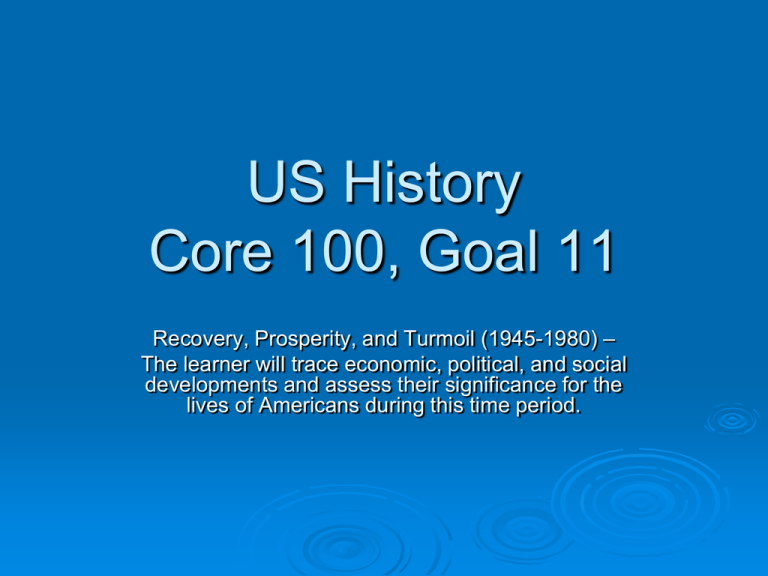
US History Core 100, Goal 11 Recovery, Prosperity, and Turmoil (1945-1980) – The learner will trace economic, political, and social developments and assess their significance for the lives of Americans during this time period. Senator Joseph R. McCarthy McCarthy suggested that some members of Congress were “Communist inclined” His tactic of damaging reputations with vague and unfounded charges became known as McCarthyism Witch Hunt Rise in 1950 and fall in 1954 w/ Army Hearings 1954 Supreme Court ruled unanimously Declared segregation in public schools unconstitutional Integration of schools Overturned Plessy v. Ferguson 9 African American students desegregated the schools President Eisenhower sends the federal troops to protect the students Federal vs. State conflict Rosa Parks was arrested for refusing to give up her seat on a bus to a white person is Montgomery, Alabama Led to a bus boycott by African Americans (lasted over a year) MLK led the boycott 1960, Greensboro, NC at Woolworth’s lunch counter 4 students at NC A&T sat at the counter. They were refused service but remained at the counter Led to national sit-in movement Group of African Americans that were protesting the segregation of interstate bus travel Angry mobs attacked the buses in the south Successful after Federal protection Aug. 28, 1963: 200,000 people peacefully gather in Washington, D.C. near the Lincoln Memorial Wanted Congress to pass the Civil Rights Act Martin Luther King, Jr.’s “I have a dream” Speech Emotional Peak of Civil Rights Movement Major lead of the Civil Rights Movement Inspired by Henry David Thoreau’s Civil Disobedience Non violence Assassinated Symbol of the Black Power Movement Advocated Black Nationalism Conflicted w/ MLK’s philosophy Assassinated Meaning varied: Believed that African Americans should control their own social, political, and economic direction of their struggle Pride, racial distinctiveness, Led to the formation of the Black Panthers Stokely Carmichael: converted to this movement Civil Rights Act of 1964: racial discrimination illegal in most public places Voting Rights Act of 1965: racial discrimination illegal in voting practices Title IX: sexual discrimination illegal in federally funded schools Americans with Disabilities Act: (ADA 1990): CORE: Congress Of Racial Equality SCLC: Southern Christian Leadership Conference SNCC: Student Nonviolent Coordinating Committee **Wanted to register voters and push for racial equality** Earl Warren: Chief Justice of major civil rights decisions Increased individual rights Thurgood Marshall: NAACP Lawyer, Brown v. Board of Education, first African American SC justice James Meredith: desegregated University of Mississippi, NO POLL TAXES!! Presidential Secession Space Race between the USSR and the US during the Cold War Sputnik was a Soviet satellite and the first in space Soviets had beaten the US again NASA created More attention on math and science in schools Sputnik NASA Man on the Moon Neil Armstrong Causes Containment Domino Theory: don’t want S. Vietnam to fall to Communism Gulf of Tonkin Resolution Ho Chi Minh becomes leader of North Vietnam and sets up Communist government Course 1st TV War ½ million U.S. troops Operation Rolling Thunder Napalm and Agent Orange Ho Chi Minh Trail Consequences Vietnam falls to Communism Divided U.S. War ends Great Society War Powers Act Tet Offensive 26th Amendment My Lai Incident Cynicism of Government Vietnamization Protests in U.S. (Kent State) Pentagon Papers (NY Times v. US) Aug 7, 1964 Authorized the president to “take all necessary measures to repel any armed attack against the forced on the United States and to prevent further aggression.” Congress handed their war powers to the president (Lyndon B. Johnson) Spring of 1968, platoon of Americans under command of Lieutenant William Calley massacred unarmed South Vietnamese civilians in the village of My Lai Most were old men, women, and children Public outrage in ‘69 College students led protests Kent State 4 kids were killed DNC: (Democratic National Convention) 1968 in Chicago Police Riot Avoided draft, burned draft cards, draft dodgers 1973 Reestablish limits on presidential war making powers Reaction to the Vietnam War President must inform Congress of any commitment of troops aboard within 48 hrs and to withdraw them in 60 – 90 days without Congressional approval “War on Poverty” Medicare: health care for the elderly Medicaid: health care for the poor HUD: Housing and Urban Development Head Start VISTA Mexican American Civil rights activist founded: National Farmer Workers Association The Feminine Mystique was a book written by Betty Friedan in 1963 Best-selling book Influenced the Women’s Rights Movement NOW: National Organization for Women Women’s Liberation Movement Gloria Steinem Phyllis Schlafly Equal Rights Amendment (ERA): FAILURE Roe v. Wade (1973): Abortion rights Sandra Day O’Connor: first woman on the Supreme Court Justice Elvis TV Radio Conformity Levittowns / Suburbs Beatniks Advertising Women’s Roles: homemakers BABY BOOMERS National Highway Act (interstates) Beatles (British Invasion) Bob Dylan SDS: Students for a Democratic Society Woodstock Haight-Ashbury Counterculture House of Un American Activities (HUAC) Julius and Ethel Rosenberg “Duck and Cover” Fallout shelters Hollywood Blacklist Alger Hiss Taft-Hartley Act: hurt unions Détente: relaxation of tensions b/t US and 2 biggest Communist countries (Soviet Union and China) China: Nixon becomes the first president to visit Communist China SALT I and II: Strategic Arms Limitation Treaty Plan to limit nuclear arms Biggest scandal in US history Illegal activities that occurred during the 1972 presidential campaign to help Richard Nixon win reelection About 40 people pleaded guilty or were convicted by juries of crimes Resulted in Nixon’s resignation from office in 1974 Causes a distrust of the government U.S. v. Nixon: cannot claim executive privilege when breaking a law


